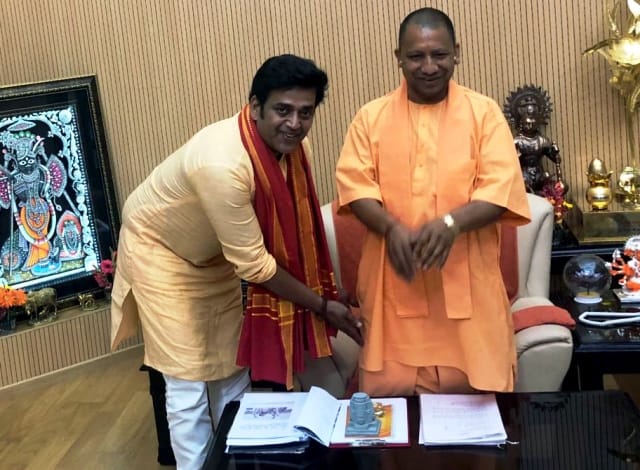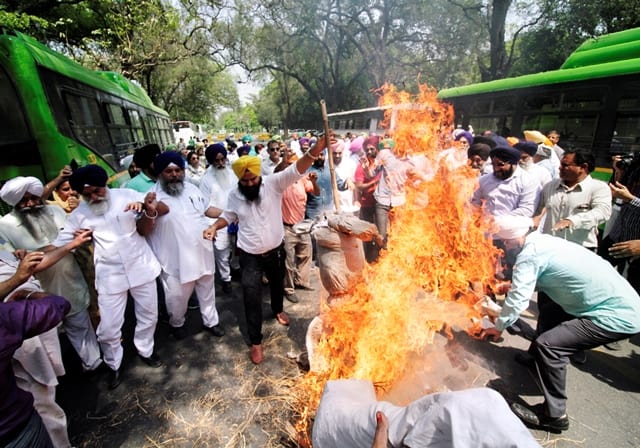
Month: April 2019

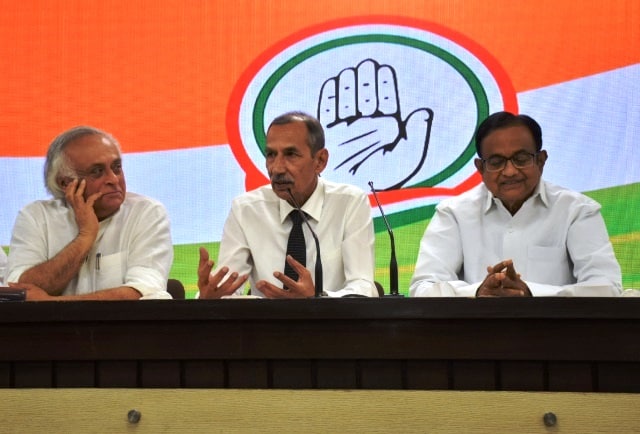
Congress Releases National Security Plan
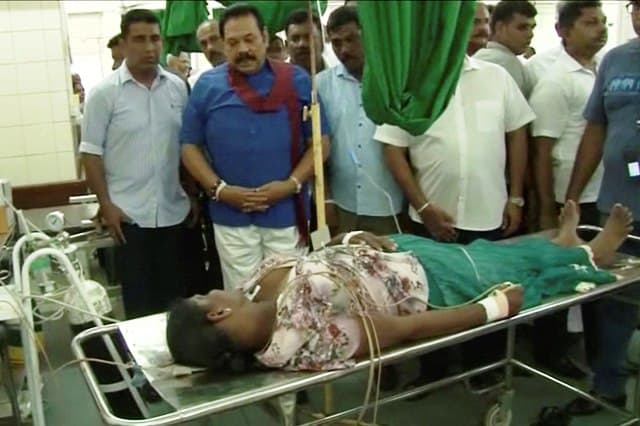
Rajpaksha Visits Blast Victims In Hospital
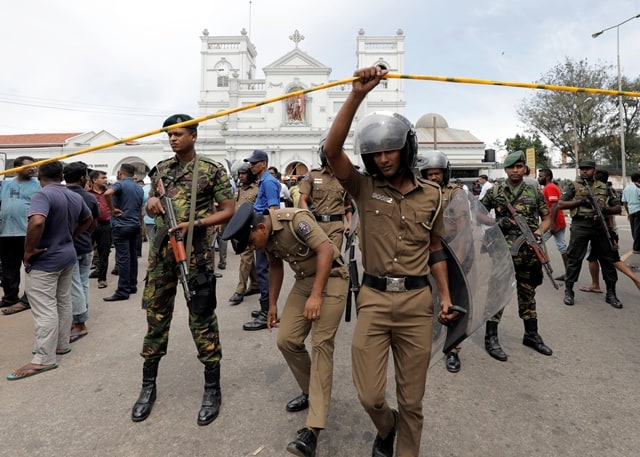
Serial Blasts Kill Over 200 In Sri Lanka
Sri Lanka’s Defence Minister Ruwan Wijewarden told CNN that seven people have been arrested in connection with the attacks. Police said that 450 people have been injured.
Eight explosions rattled various suburbs in Sri Lankan cities of Colombo, Negombo, Kochchikade and Batticaloa as the Christian community celebrated Easter Sunday. Out of the deceased, around 20 people have been identified as foreigners, reported CNN.
A 12-hour curfew will come into force in Sri Lanka on Sunday evening till 6 am on Monday in the wake of the devastating blasts, according to Sri Lankan President Maithripala Sirisena’s secretary, Udaya R Seneviratne.
Schools across the island nation will also remain shut until Wednesday due to security concerns.
In a bid to curb fake news, the Sri Lankan government has temporarily blocked popular social networking sites including Facebook and Instagram, CNN reported quoting officials.
No group has claimed responsibility for the attacks yet.
The international community has also condemned the multiple blasts, with leaders from the United Kingdom, India, Nepal, European Union expressing their grief due to the bombings.
(ANI)
]]>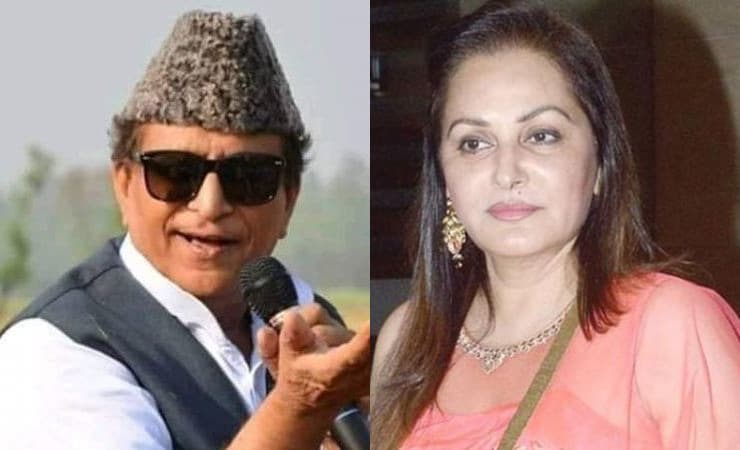
The Inherent Misogyny In Indian Politics
The ongoing campaign for India’s Lok Sabha polls is plumbing new depths on a daily basis. As electioneering gathers momentum, reports of politicians using coarse and abusive language against their opponents have become a regular occurrence.
Though male politicians, especially high-profile leaders like Congress president Rahul Gandhi, are constantly targeted by rivals, it is the women politicians who are the worst off. Civility in public life is now a rare phenomenon as women politicians are finding out to their own peril, having to continuously contend with the worst possible sexist and misogynistic comments. From being called “prostitutes”, “skirt wali bai” and “nach gaane wali” to comments on their physical appearance and how they dress, women in politics have to face all this and more.
The offenders come from across the political spectrum and the insulting language used by them has become such a regular feature that both their party bosses and the public at large view it as acceptable behavior, putting it down to election fever. The common excuse proffered for this behavior is that “people sometimes get carried away in the heat of the moment.” If at all there is any outrage and anger, it is confined largely to the social media.
Samajwadi Party leader Azam Khan, who is not new to controversies, touched a new low recently while campaigning against Jaya Prada, a former film actor who has been fielded by the Bharatiya Janata Party from the Rampur Lok Sabha constituency. Addressing a public meeting, Khan remarked, “It took you 17 years to understand her true face. But I realised in 17 days… that she wears khaki underwear.” And, of course, an unrepentant Khan shrugged off these comments, merely saying these were not meant for Jaya Prada. Similarly, another Samajwadi Party leader Firoz Khan had not held back in degrading Jaya Prada. “Rampur ki shaamein rangeen ho jaayengi ab jab chunavi mahual chalega (Rampur’s evenings will turn colourful in this election season),” he had said at an election rally, clearly referring to her former career in films.
While Jaya Prada has always been at the receiving end, primarily because she comes from the world of cinema, other women politicians are not spared either. Priyanka Gandhi Vadra, the newly-appointed Congress general secretary, is currently the prime target of her political rivals. From comments about her clothes to her looks, nothing is off-limits.
The gamut of comments ranges from being called a “choclatey face”, “Sarupnakha” (Ravan’s sister) and “Pappu ki Pappi”. BJP’s Bihar minister Vinod Narayan Jha had derisively remarked that Priyanka Gandhi Vadra may be beautiful but has no political achievement to her credit. His party colleague Harish Dwivedi did no better. He chose to comment on Priyanka’s clothes, stating at another election rally that “Priyanka Gandhi wears jeans and top in Delhi but wears a sari and sindoor when she tours rural areas. Senior BJP leader Kailash Vijavargiya went a step further when he remarked that Priyanka’s entry into politics was similar to fielding Kareena Kapoor or Salman Khan in elections. “The Congress does not have strong candidates, so it is bringing in these charming faces,” he sneered.
Bahujan Samaj Party leader Mayawati is another “favorite” with the abusers. As a woman, the BSP chief has many “disadvantages” to her credit: She is heading a party, has been a chief minister, nurses Prime Ministerial ambitions but above all, she is a Dalit. A scheduled caste woman leader, who had the temerity to upset the social status quo, is anathema to male politicians, especially those belonging to the upper castes. As a result, her adversaries consistently demean and disparage her.
When Mayawati recently mocked Prime Minister Narendra Modi for calling himself a chowkidar while living in royal style, BJP leader Surendra Singh responded by stating that the BSP chief coloured her hair and gets a daily facial to “hide her age.” And when the BSP teamed up with the Samajwadi Party, another BJP leader did not blink before calling her a “transgender”. Three years ago, another BJP leader from Uttar Pradesh had accused Mayawati of selling tickets like a “prostitute,” a remark which was defended by his wife Swati Singh.
But BJP leaders are not the only offenders here. Misogyny cuts across political barriers. Sanjay Nirupam, former president of the Mumbai Regional Congress Committee, had, in the course of a television debate, jeered Union Smriti Irani, calling her “thumke lagane wali”. Congress alliance partner Jaydeep Kawade, fared no better, stating that Irani wears a bindi and “that the size of a woman’s bindi keeps grows as she changes husbands.”
As charges and counter-charges fly thick and fast, it appears that there is going to be no early end to this coarsening debate. It is little wonder that women hesitate to enter politics as political parties have no systems in place to check such behaviour. On the other hand, the conduct of offending politicians is invariably shrugged off without inviting any form of punishment from their party bosses.
This comes at a time when political parties, in an effort to appear more gender-friendly and to get a slice of the women’s vote, have publicly declared that they would give more tickets to women and even implement a quota for women in party structures. However, their commitment can easily be gauged by the fact that the women’s reservation bill, providing quotas for women in Parliament and state assemblies, has been pending for nearly two decades while the pledge to give more representation in the party organisation and the selection of candidates invariably remains unfulfilled.
]]>CJI Faces Sexual Harassment Accusations
“The independence of the judiciary is under very serious threat and there is a larger conspiracy to destabilise the judiciary,” the Bench said.
A Bench consisting Chief Justice Ranjan Gogoi and Justices Arun Mishra and Sanjiv Khanna did not pass any judicial order and left it to the wisdom of the media to decide on the publication of reports in order to protect the independence of the judiciary.
“Having considered the matter, we refrain from passing any judicial order at this moment leaving it to the wisdom of the media to show restraint, act responsibly as is expected from them and accordingly decide what should or should not be published as wild and scandalous allegations undermine and irreparably damage reputation and negate independence of judiciary. We would therefore at this juncture leave it to the media to take off such material which is undesirable,” the Bench said.
Chief Justice clarified that charges against him will be examined by other senior judges and not by himself.
Justice Mishra urged the media to exercise restraint and act responsibly so that the independence of the judiciary is not affected by such “wild and baseless allegations”
“We are not passing any judicial order at this moment. We, however, ask media to show restraint, responsibility, and wisdom so that independence of the judiciary is not affected by such wild and baseless allegations”, Justice Mishra said.
During the hearing, the Chief Justice said that it was an attempt to deactivate the office of the Chief Justice of India.
“This is unbelievable. I will not stoop so low even in denying it”, Justice Gogoi said while making it clear that he will continue in his office till the end of his tenure.
Chief Justice added, “What I want to tell the citizens of this country is that the judiciary is under very very serious threat. I will sit on this Bench and discharge my duties without fear or favour.”
Gogoi further said why does a person want to become a judge, reputation is all that matters. “Why would any sane person want to become a judge? Reputation is all that we have. That is also under attack,” he said.
“There is some bigger force behind the woman who made sexual harassment charges. I am very hurt with the allegations levelled against me. I have communicated with four media houses, which have published stories against me,” he added.
Speaking on his savings, the CJI said, “A bank balance of Rs. 6,80,000 is all I have. After 20 years and Rs. 6,80,000 as bank balance this is the reward a Chief Justice of India gets.”
Justice Gogoi said that the complainant, who levelled allegations of sexual harassment, has a criminal background and two FIRs are registered against her. “If she has criminal cases against her then how did she enter the supreme court service?” he asked.
He also mentioned that he asked for a special sitting as “things have gone too far. The judiciary cannot be targeted”.
Justice Gogoi also said that employees in the Supreme Court are treated fairly and equally and these allegations surfaced, “I didn’t think it was appropriate to respond to them”.
The apex court has termed the meeting as “a matter of great public importance”. It said that it’s in the “chief justice’s court to deal with a matter of great public importance touching upon the independence of the judiciary, on a mention being made by Tushar Mehta.”
Attorney General KK Venugopal and Solicitor General Tushar Mehta both were present during the hearing.
(ANI)
]]>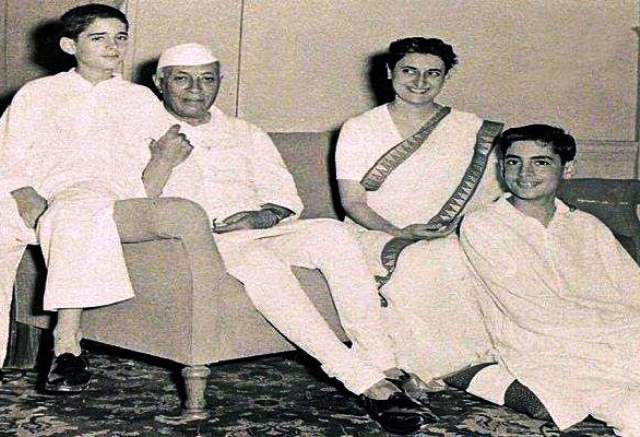
Why BJP Seeks To Discredit Nehru, And Family
Nehru is BJP’s principal target because he not only ‘discovered’ India but also piloted what free India became for 16 long years
A cartoon doing media rounds amidst the Election 2019 campaign shows India’s first prime minister Jawaharlal Nehru, a mischievous smile on his face, decamping with all ‘achievements’ of Prime Minister Narendra Modi.
Arguably, this responds to Nehru’s sustained denigration by the Modi Government, Bharatiya Janata Party (BJP) and its affiliates. Subtle and defensive, it is unable to match the aggressive campaign to render India “Congress-free.”
Congress chief Rahul Gandhi, called ‘pappu’ (simpleton) and worse for long claims he nurses no grudge against Modi. He even hugged him in parliament. But his gesture that critics panned but some thought could be a game-changer, has drowned in hate-filled cacophony.
ALSO READ: Modi Is Delivering On One Promise
On the Rafale aircraft deal wherein the government has allegedly favoured a business house, Rahul says that Modi, who calls himself ‘chowkidar’ (watchdog), is actually a ‘thief’ — “chowkidar chor hai”. His using this jibe, unwisely attributing it to the Supreme Court has, however, landed him in trouble. Like ‘chai’ (tea) in 2014, ‘Chor’ has become this election’s buzzword.
The opposition parties have found no reply to the Modi-led campaign that focuses heavily, but selectively, on national security issues. The focus is solely on Pakistan (Muslims at home, beware!). With helpful sections of media, China (military standoff in Sikkim, alleged dumping of consumer goods and shielding of Pakistani militant Masood Azahar) is tactfully kept out.
The campaign of calumny is extended to all critics of the government. They are being dubbed “anti-national,” prompting even marginalized BJP patriarch L K Advani to protest.
Take note — beneath this mutual name-calling, some of it personal and derogatory, some targeting religious minorities and Dalits and unsparing of women, is a thinly concealed ideological war. Howsoever diluted and putrid, it makes this Lok Sabha election, although 17th over seven decades, a watershed.
Socialist leader Ram Manohar Lohia, among last of India’s thinking politicians, classified the country’s political cultures into Congress, communist/socialist and “Hindu nationalist” Jana Sangh (BJP’s earlier avatar).
Of the three, the communists, having scored several self-goals are marginalized in the essentially right-of-centre discourse. Contradictions-prone socialists, both anti-Congress and anti-communist, are divided into caste-oriented regional parties, further divided on support and opposition to Modi/BJP. They are among the numerous regional parties scattered across the country hoping to be king-makers, should a clear parliamentary majority elude Modi.
The fight for the national space, thus, is essentially between a weak but vying-to-surge Congress and BJP, now the country’s dominant political force ruling at the Centre and in 20 states. This sharpens the conflict as never before with baiting Nehru and his family is an important ingredient.
Campaign against Nehru is not new; nor against his daughter Indira and grandson Rajiv who later became the premiers; nor against Italian-born Sonia who snatched power from BJP in 2004.
It gained currency each time the Congress lost power. US-based writer Ved Mehta did a scathing study, and so did many others, including Nehru’s own one-time private secretary, M O Mathai. While Mehta is forgotten, Mathai’s scurrilous writings keep re-surfacing.
Atal Bihari Vajpayee (1998-2004), a BJP premier, but a liberal and a known Nehru admirer, had discouraged this. There was some grace in public discourse. Attacking Mahatma Gandhi and demonizing the Nehru-Gandhi family were confined to those believing in undoing India’s 1947 Partition. They gained little political currency.
It’s no holds barred now since the Congress performed abysmally in 2014 and the BJP consolidated it hold. The Mahatma’s assassin, too, has a temple.
ALSO READ: Statues Come And Go, Ideas Survive
Now, we gather through books and social media, that the Nehrus were “Muslims-converted to Hinduism”; that Indira married Firoze Gandhi, a Muslim, not a Zoroastrian and that after Sonia married Rajiv and their daughter Priyanka married Robert Vadra, the family has become ‘Christian’.
Significantly, this has gained currency, especially among the urban educated who, otherwise call themselves ‘modern’, but don’t pause to think why and how should religions matter.
Sadly, those who have failed to create history are now attempting to rewrite history wherein Nehru has a place that cannot be deleted. This has accompanied attempts to appropriate past leaders like Sardar Patel (with world’s tallest statue) and Madan Mohan Malaviya (conferred Bharat Ratna, highest civilian award).
Nehru is their principal target because he not only ‘discovered’ India through his iconic book, but also piloted what free India became, good or otherwise, for 16 long years. Countering the fact that Chandigarh city and Bhakra-Nangal dams were built under Nehru’s watch and his role in establishing institutions of science and higher education is integral to the BJP’s search for a raison d’etre.
Congress’ own performance over the past six decades has greatly contributed to this process. It has shed much of the Mahatma-Nehru ethos. For the many good she did, Indira stands identified with the draconian Emergency. Rajiv’s ill-advised play of the Hindu-Muslim/mandir-masjid game to counter BJP in the 1980s only helped the latter’s consolidation.
Today, his son Rahul eschews any secular pretense, politically, and is declared a sacred thread-wearing Shaivite. Nehru’s agnostic approach and Indira Gandhi’s secularism are passé.
Like secularism, socialism — the ‘allies’ the Congress is fighting include the communists. The historic collaborate-despite-conflict relationship is over when, ironically, Congress election manifesto, a document of substance, qualifies it to be slotted as a progressive, left-of-centre force. In a double-irony, it also distinguishes it from the BJP, whose B team it is perceived to be playing.
Worse, the party’s democratic DNA has changed. It has become a family fiefdom. Its members at all levels can’t even conceive of a leader other than a Nehru-Gandhi at the top. This has been on for half a century now, since Indira split the party in 1969 and again in 1978, when party heads and state chief ministers began being appointed from New Delhi.
This ‘dynasty’ bit has refurbished with the entry of Priyanka. Congress’ most potent weapon, she could confront Modi in Varanasi. She has a striking public presence and reports are that she charms with her conversational style. Whether her resemblance to grandma Indira, who was assassinated 34 years ago, would appeal to people, particularly 85 million young, remains to be seen.
ALSO READ: Priyanka’s Entry Makes Elections Exciting
Modi uses ‘dynasty’ as a dirty word at will, only against the Congress, despite the fact that the BJP has 18 such families of its own. BJP’s own decision-making is over-centralized in just two – Modi himself and party chief Amit Shah.
He prides himself in being unattached and thus, incorruptible. It’s not that one thing proves the other. But he is targeting, rightly or otherwise, other singles on graft charges. Mayawati, Mamata Banerjee, Navin Patnaik are single Supremos, like late Jayalalithaa was. And he is selective about family-run parties of M K Stalin, Chandrababu Naidu and his rival Jaganmohan Reddy, Sharad Pawar, Lalu Prasad, Mulayam Singh/Akhilesh Yadav, the Abdullahs, besides Telengana’s Chandrashekhar Rao and Karnataka’s Kumaraswamy.
To return to the Congress, its prospects remain iffy despite its electoral victories in three states last December. Ironically, they have made it difficult for the party to negotiate alliances. Its young president who bears the brunt for “sixty years of Congress rule” is himself an untried man never having held office in a government. He cannot rally the opposition behind him because the seniors out there are afraid that the party could re-emerge at their cost. Seen as weak or indecisive, his state satraps have also scuttled pre-poll alliance(s) that could have effectively challenged the BJP. The opposition has a plethora of prime ministerial candidates. This is advantage BJP.
Besides what happens of Modi/BJP, the other key takeaway of the current elections will be the future of the Congress Party, India’s oldest. Of course, India is not, and cannot be a two-party state for a long time. These elecions will determine the role they could play in shaping the course of the nation’s destiny. It will decide which way, and how. India’s polity and society will go in the near future.
The writer can be reached at mahendraved07@gmail.com
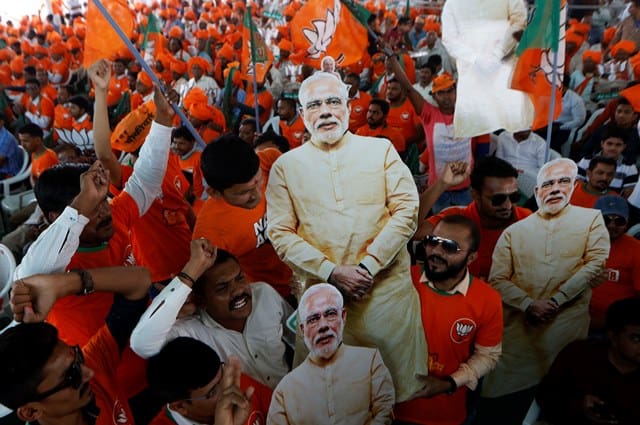
Modi Supporters At Himmatnagar Rally
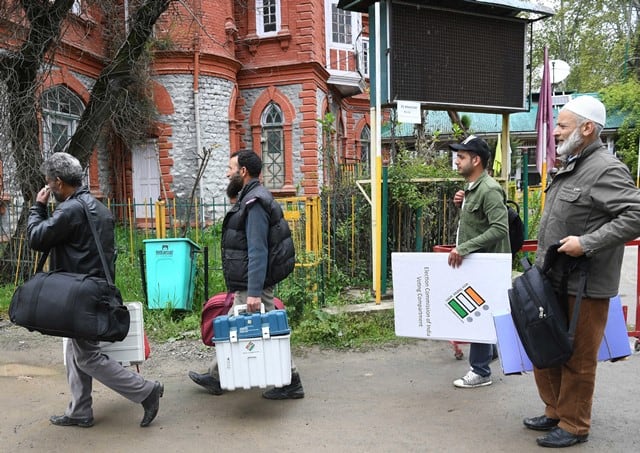
Kashmiri Poll Officials Brace For Lok Sabha Elections
